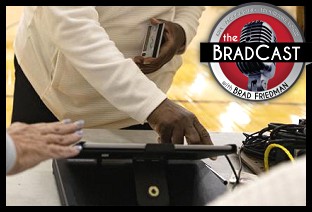Guest: Jeanne Devon of Alaska's Mudflats with all the inside skinny; Also: Zelenskyy chides the U.N. Security Council as evidence of Russian war crimes mount; Three GOP Senators will vote for KBJ...
 Santa, according to my guest today on The BradCast, is a "democratic socialist". Sarah Palin, on the other hand is...well...Sarah Palin, and she has decided to "un-quit politics." [Audio link to full show is posted below this summary.]
Santa, according to my guest today on The BradCast, is a "democratic socialist". Sarah Palin, on the other hand is...well...Sarah Palin, and she has decided to "un-quit politics." [Audio link to full show is posted below this summary.]
Before we get there today, however, a bit more on the grim news coming out of Ukraine this week, as independently documented evidence of horrific war crimes by Russia continues to mount. On Tuesday, President Volodymyr Zelenskyy addressed the U.N. Security Council from Ukraine and charged that if the U.N. is unable to remove Russia's veto, as a permanent member of the Council, then they might as well dissolve it entirely. He has a point.
Then, before we get to Sarah and Santa...The news that shouldn't be news at all. Three Republican Senators have now announced they intend to vote in favor of Joe Biden's nominee, Judge Ketanji Brown Jackson, perhaps the most qualified jurist every nominated to the U.S. Supreme Court. On Monday night, Utah's Mitt Romney and Alaska's Lisa Murkowski declared they will support Brown's confirmation, joining Maine's Susan Collins who did so last week. None of that should be news at all, but in the Republicans' twisted, hyper-partisanized world, voting for a SCOTUS nominee tapped by a Democratic President apparently it is. During Monday's Senate Judiciary Committee hearing, South Carolina's Lindsey Graham (who voted for Jackson's appointment to a federal Appeals Court seat just last year, but refuses to vote for her this year) said the quiet part out loud when he declared that if Republicans win back the Senate in November, none of Biden's nominees are likely to be seated to the federal bench.
In other insane GOP Congressional news, Michigan Rep. Fred Upton announced today that he will not seek re-election. He is the fourth of 10 Republican House members who voted in favor of Donald Trump's second impeachment (for inciting the January 6th insurrection) to retire instead of run for re-election.
Meanwhile, way up north in Alaska, more than 40 candidates are now running in the upcoming June Special Election to fill the state's one U.S. House seat, which had been held for 49(!) years by Don Young, the 88-year old Republican Congressman who died suddenly last month.
Donald Trump has chosen his favorite candidate in the race, the one my guest today describes alternately as "The Quitter" and the "former half-term Governor", Sarah Palin. The failed 2008 Vice Presidential candidate is emerging from Alaskan and rightwing media obscurity in hopes of finding relevance again in the far-right wingnut world she helped create during her 2008 run, just before quitting politics halfway through her first term as Alaska's Governor. Palin signed up to run for the Special Election and regular general election primaries --- both to be held on June 11th --- on the final day to qualify, last Friday on April Fools Day. (Seriously.)
We're joined today by one of the nation's foremost Palinologists, JEANNE DEVON, who made a name for herself as "AK Muckraker", helping to introduce Palin to the world in 2008 at her award-winning The Mudflats blog. She has since gone on to co-write a NYTimes best seller, Blind Allegiance to Sarah Palin - A Memoir of Our Tumultuous Years, and served as Press Secretary for Alaska's state Senate Democrats and as Communications Director for the state's Democratic Party. (She is currently working with FX to develop a television series based on her book, The Blood of Patriots, which she co-wrote will Bill Fulton about the Alaska militia movement.)
Before we get to Palin and the potentially insane way that Alaska is about to run its Special Election, Devon offers some thoughts on the decades long legacy of the late Don Young who, though "he didn't have that much power anymore" after being stripped of Congressional committee assignments due to "blatant corruption," was still "an institution, and Alaskans like their institutions."
While some in the media have been regarding Palin as the front-runner to fill Young's seat, Devon seems less convinced. "Palin's approval rating and likeability has been underwater since she quit [in 2009.] She is not a popular figure in the state anymore." Devon cites a comment she saw at today one of the "hardcore fringey rightwing" Facebook groups she sometimes drops in on, suggesting those folks do not appear to be fans. "Very hard pass," she reports one commenter as writing, adding "she quit once when the going got tough. And in my mind that defines her entire political career."
A lack of popularity is not all Palin will have to contend with. There are more than 40 candidates running in both the Special and regular primaries, which will be held on the same day. Palin has signed up for both. But in addition to several progressive candidates Devon cites, with impressive resumes and following, she seems most excited about one candidate on the ballot with at least as much "name recognition" as Palin: Santa Claus!
Yes, Claus is "actually a member of the North Pole City Council" and "literally on the ballot". He represents what Devon describes as "one of the most conservative towns in Alaska" and "he is a democratic socialist --- of course --- because he's Santa!"
Devon notes, however, that "Santa Claus has also said he will not run for the next full term. He will just run to finish the end of Don Young's term. Because we are now faced with two elections."
As to those two elections, they will be run under a new scheme in the state. For the first time, anybody who wants to run for office can simply sign up to run, no petition gathering necessary. (Thus, the 40+ candidates!) The top four vote-getters in the primary will then go on to the general election, which will use Ranked Choice Voting (RCV) --- a confusing and difficult to both count and oversee method of voting, allowing voters to rank their choices for the office. (As I explain to Devon, when and if Alaska tires of RCV, as many jurisdictions do after using it, when they discover that neither voters nor candidates understand it, they may wish to look into the simpler Approval Voting method, allowing voters to choose Yes or No for all candidates on the ballot. Easier to understand, to count and to oversee, since computers and centralized counting aren't needed for the complicated math and many rounds of tallying necessary under RCV.)
Of course, Devon has much more insight on what is likely to be a fascinating and/or hilarious race, with both Palin and Clause on the ballot. Additionally, there are six Democrats on the Special Election ballot. Among them, she cites "Christopher Constant, who was the first openly gay person to be elected to the Anchorage Assembly --- and remember, Anchorage is half the population of the state. Then there is Mary Peltola, who long ago served 12 years in the legislature. She's an amazing Native leader who is also an expert in fisheries, which is important up here. And there's a sitting legislator from Fairbanks named Adam Wool. So all of these are Democrats who could certainly fill that slot."
She also has some thoughts to share on Sen. Murkowski, who is up for re-election this year as a Republican --- after voting to remove Trump from office in his second impeachment and declaring her support for Ketanji Brown Jackson this week. Will that doom her chances of re-election? Tune in to find out what Devon has to say about that race --- which will also be run as a top-four primary contest with an RCV general, in a state which has a history of plenty of election and tabulation controversy in recent years.
Finally, after that amusing segment, Desi Doyen joins us to ruin all the fun, as usual, with our latest Green News Report, including special coverage of the U.N. IPCC's latest report warning that Planet Earth is likely to blow past the climate targets set by the Paris Climate Accord, even though, as the scientists note in their report, it is still not too late for the nations of the world to institute mitigation efforts to avoid catastrophic global warming in our all-too-near future...
 CLICK TO LISTEN OR DOWNLOAD SHOW!...
CLICK TO LISTEN OR DOWNLOAD SHOW!...
* * *While we post The BradCast
here every day, and you can hear it across all of our great affiliate stations and websites, to automagically get new episodes as soon as they're available sent right to your computer or personal device, subscribe for free at iTunes, Pandora, TuneIn, Google, Amazon or our native RSS feed!* * *



 Sunday 'Now Hoarding' Toons
Sunday 'Now Hoarding' Toons Mad World:
Mad World: 'Green News Report' 5/15/25
'Green News Report' 5/15/25
 Plane Corruption and the Future of the DOJ: 'BradCast' 5/14/25
Plane Corruption and the Future of the DOJ: 'BradCast' 5/14/25 'Deeply Evil': GOP Proposes Largest Medicaid Cuts in History: 'BradCast' 5/13/25
'Deeply Evil': GOP Proposes Largest Medicaid Cuts in History: 'BradCast' 5/13/25 'Green News Report' 5/13/25
'Green News Report' 5/13/25 And Then They Came for the Mayors...: 'BradCast' 5/12/25
And Then They Came for the Mayors...: 'BradCast' 5/12/25 Sunday 'New Guy, Old Guy' Toons
Sunday 'New Guy, Old Guy' Toons Blowing Smoke. At the Vatican and White House: 'BradCast' 5/8/25
Blowing Smoke. At the Vatican and White House: 'BradCast' 5/8/25 'Green News Report' 5/8/25
'Green News Report' 5/8/25 SCOTUS Weighs Public Funding of Religious Schools: 'BradCast' 5/7/25
SCOTUS Weighs Public Funding of Religious Schools: 'BradCast' 5/7/25 Trump Judge Blocks NC GOP Theft of 2024 Supreme Court Seat: 'BradCast' 5/6/25
Trump Judge Blocks NC GOP Theft of 2024 Supreme Court Seat: 'BradCast' 5/6/25 Prosecutors Quit After U.S Attny Strikes Deal With Felon Cop: 'BradCast' 5/5/25
Prosecutors Quit After U.S Attny Strikes Deal With Felon Cop: 'BradCast' 5/5/25 Trump Losing Streak Continues into SECOND Hundred Days: 'BradCast' 5/1/25
Trump Losing Streak Continues into SECOND Hundred Days: 'BradCast' 5/1/25 100 Daze (w/ Digby and Driftglass): 'BradCast' 4/30/25
100 Daze (w/ Digby and Driftglass): 'BradCast' 4/30/25 Campaign to 'Impeach Trump Again' Gains Fresh Momentum: 'BradCast' 4/29/25
Campaign to 'Impeach Trump Again' Gains Fresh Momentum: 'BradCast' 4/29/25 And Then They Came for the Judges...: 'BradCast' 4/28/25
And Then They Came for the Judges...: 'BradCast' 4/28/25 Trump EPA Guts Enviro Justice Office: 'BradCast' 4/24/25
Trump EPA Guts Enviro Justice Office: 'BradCast' 4/24/25
 VA GOP VOTER REG FRAUDSTER OFF HOOK
VA GOP VOTER REG FRAUDSTER OFF HOOK Criminal GOP Voter Registration Fraud Probe Expanding in VA
Criminal GOP Voter Registration Fraud Probe Expanding in VA DOJ PROBE SOUGHT AFTER VA ARREST
DOJ PROBE SOUGHT AFTER VA ARREST Arrest in VA: GOP Voter Reg Scandal Widens
Arrest in VA: GOP Voter Reg Scandal Widens ALL TOGETHER: ROVE, SPROUL, KOCHS, RNC
ALL TOGETHER: ROVE, SPROUL, KOCHS, RNC LATimes: RNC's 'Fired' Sproul Working for Repubs in 'as Many as 30 States'
LATimes: RNC's 'Fired' Sproul Working for Repubs in 'as Many as 30 States' 'Fired' Sproul Group 'Cloned', Still Working for Republicans in At Least 10 States
'Fired' Sproul Group 'Cloned', Still Working for Republicans in At Least 10 States FINALLY: FOX ON GOP REG FRAUD SCANDAL
FINALLY: FOX ON GOP REG FRAUD SCANDAL COLORADO FOLLOWS FLORIDA WITH GOP CRIMINAL INVESTIGATION
COLORADO FOLLOWS FLORIDA WITH GOP CRIMINAL INVESTIGATION CRIMINAL PROBE LAUNCHED INTO GOP VOTER REGISTRATION FRAUD SCANDAL IN FL
CRIMINAL PROBE LAUNCHED INTO GOP VOTER REGISTRATION FRAUD SCANDAL IN FL Brad Breaks PA Photo ID & GOP Registration Fraud Scandal News on Hartmann TV
Brad Breaks PA Photo ID & GOP Registration Fraud Scandal News on Hartmann TV  CAUGHT ON TAPE: COORDINATED NATIONWIDE GOP VOTER REG SCAM
CAUGHT ON TAPE: COORDINATED NATIONWIDE GOP VOTER REG SCAM CRIMINAL ELECTION FRAUD COMPLAINT FILED AGAINST GOP 'FRAUD' FIRM
CRIMINAL ELECTION FRAUD COMPLAINT FILED AGAINST GOP 'FRAUD' FIRM RICK SCOTT GETS ROLLED IN GOP REGISTRATION FRAUD SCANDAL
RICK SCOTT GETS ROLLED IN GOP REGISTRATION FRAUD SCANDAL VIDEO: Brad Breaks GOP Reg Fraud Scandal on Hartmann TV
VIDEO: Brad Breaks GOP Reg Fraud Scandal on Hartmann TV RNC FIRES NATIONAL VOTER REGISTRATION FIRM FOR FRAUD
RNC FIRES NATIONAL VOTER REGISTRATION FIRM FOR FRAUD EXCLUSIVE: Intvw w/ FL Official Who First Discovered GOP Reg Fraud
EXCLUSIVE: Intvw w/ FL Official Who First Discovered GOP Reg Fraud GOP REGISTRATION FRAUD FOUND IN FL
GOP REGISTRATION FRAUD FOUND IN FL


























 On today's
On today's 
 On today's
On today's 
 On today's
On today's 
 On today's
On today's 
 We've got a very busy and eclectic
We've got a very busy and eclectic  It's
It's  A bad day for Donald Trump is generally a good day for America. Today on
A bad day for Donald Trump is generally a good day for America. Today on 
 Santa, according to my guest today on
Santa, according to my guest today on 













